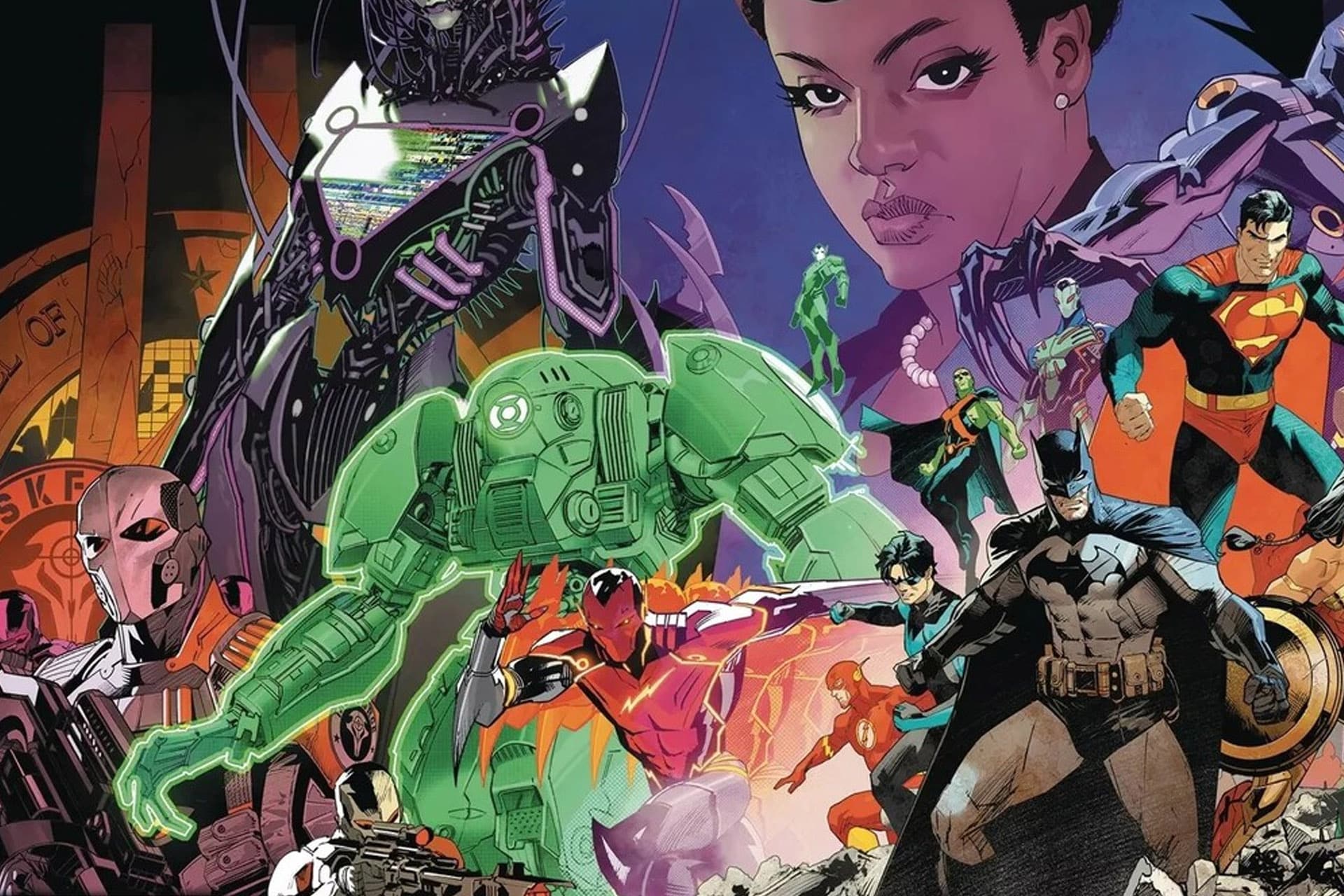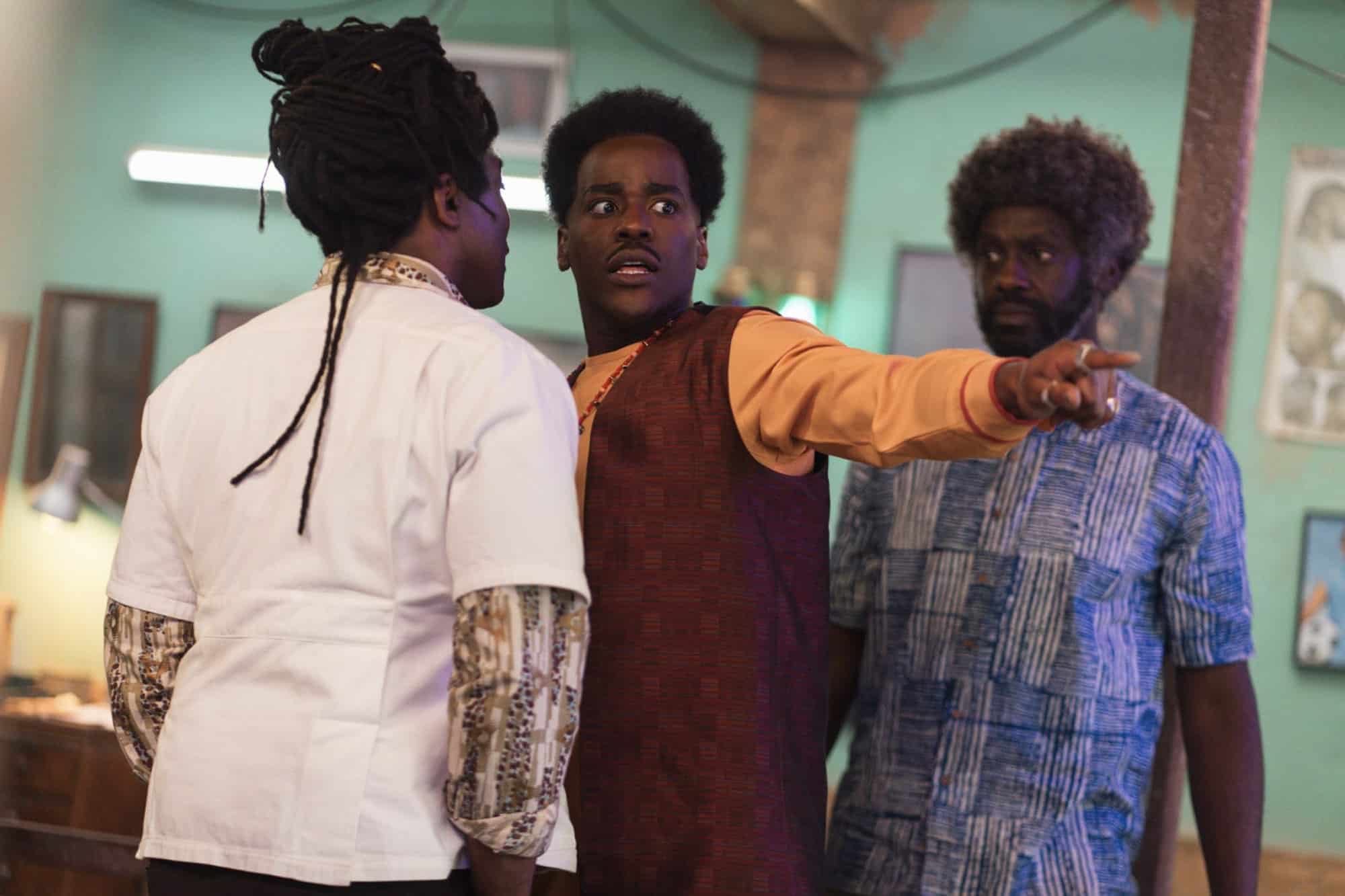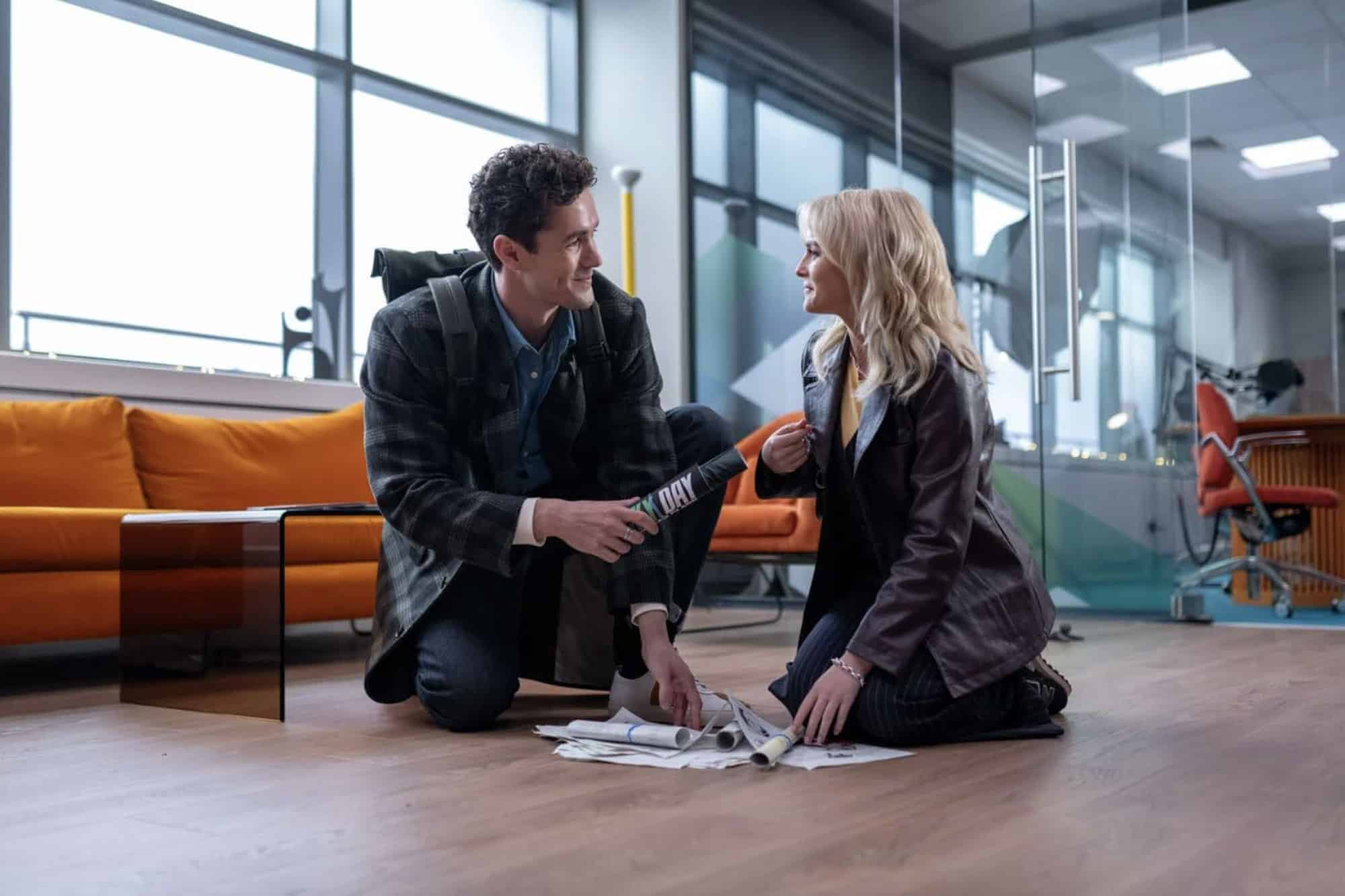- Series: 10
- Episode: Twelve
- Duration: 60 minutes
- Writer: Steven Moffat
- Director: Rachel Talalay
Why not, just at the end, just be kind
Well, who’d have thought. The signs were there, we’ve been watching the Man with No Name for the last three years.
Series Eight concluded in a graveyard, with a stand-off twisted from The Good, The Bad and the Ugly. Series Nine spent several days in the scrub lands of Gallifrey as Doctor Joe stuck to his ranch, brooking no sheriffs from the big town. And now come the Twelfth Doctor’s final series, hurrah! He’s become the Magnificent Twelfth. Or maybe the Magnificent five… The Doctor, the Cyberman, the cyborg and the Genius twins. What a mismatched posse, right?
What unfolds from the lengthy but taut scene that straddles the title sequence is not only a compelling case for Doctor Who to claim the 60 minute format permanently, but a reassertion of its preeminent role as the show that can scare, amuse, surprise and provide some moralistic bone to chew on for families across the globe. A bit highfalutin, right? But highfalutin is what this is all about.
Writer Steven Moffat’s chucked the TARDIS sink at the screen a few times before, but seldom has it stuck so well. Surprisingly well. I won’t beat around the exploding bush here — The Doctor Falls can rightfully lay claim to being one of the new era’s greatest finales. It ticks a lot of boxes. Those boxes are big, but even more satisfactory, the ticks are gigantic. There’s barely a spoiled vote to be found.
Where else but to start at the beginning, in what’s also, unexpectedly, a brilliantly structured finale.
Upgrading the concept
It’s a mathematical impossibility.
It starts well. Although The Doctor Falls pulls the action forward to an entirely different environment from the tight spaces that paved the temporal-claustrophobia of the first part, Moffat doesn’t cheat the cliff-hanger. While last week I admired the lack of a creator in this Genesis of the Cybermen, The Doctor Falls grabs that concept and springs from it. We suddenly have the Doctor trussed up and wheeling around like his own kind of Davros, tweaking the Cybermen’s development, as he pithily character assassinates the two Masters. Quite correctly it turns out. The returning Master was apparently pulling a great deal many more strings than we thought last week.

Masterly demise
Somehow you ended up in this dump? Never could drive.
There’s barely a moment to pine for the brilliantly funny Mr Razor of the previous episode as John Simm’s Master brings another, more classic humour to fill the void. And in there is a wonderful piece of layering. While the Master obviously needed to disguise himself from Bill as her former Prime Minster, it was also a necessity to survive among the Mondasians who revolted against his vicious rule.
You deserve my best.
The foil between the two nefarious incarnations is wonderful to watch — certainly exceeding my expectations. From their rooftop menace, with its double-crossing and extraordinary violence in slo-mo flashback, to their own final, mutually destructive stand-off. Both condemned from the moment they meet, what better ending is there for the Doctor’s greatest frenemy than in a riotous, murderous comedy. It’s all far removed from the willfully facetious treatment of Missy’s deaths in Series Nine, as befits .There’s little doubt that a new incarnation will return some time in the future, but one of the Master’s greatest exits will keep us going for a while.
This is our perfect ending. We shoot ourselves in the back.
As usual with the latest incarnation, ambiguity surrounds Missy. There’s still a question marks over the inevitability of the Master standing with the Doctor come the end.
The way you burned like the sun… I remember that feeling. And I always will, And I will always miss it
And while this Masterful pairing does verge on The Curse of Fatal Death at points, (Moffat’s first run at Doctor Who) — from the classic Simm asides (“tedious”), to the brilliant comedy of the two incarnations playing the same transparent betrayal (“The Doctor’s dead. He told me he always hated you”) — there’s also some gloriously dark lunacy.
The Doctor Falls is many things, including an excellent reprieve for John Simm’s Master across a blinding two-part stew of mischievous fun. While she’s mildly perhaps underused, Michelle Gomez steals scenes, presenting a complexity and ambiguity never seen int he character before. And as ever, she’s utterly unpredictable. The ending just wouldn’t be the same without the pair. And it’s a truly great ending for them both.
Best of both worlds
The Cybermen are coming
The travails of this timeline-crossing couple aren’t the only times The Doctor Falls manages to have its cake and eat. Despite the lofty threat laid down by the regenerative energy at the head of the story or the ravaging of a companion, it somehow manages to self-regulate. One example comes early on, in a deft explanation for this new genesis. “There’s no evil genius,” the Doctor explains, “Just parallel evolution”. How true. It doesn’t seek to bogging us in the concept of destiny, we’ve already seen the inevitability of cyberisation fall on the human race rather than Mondasians in a parallel universe of course, but opens up a Who universe is open for frequent alternative trips to the birth of Who’s second greatest foes. And to lift us out of this opening puzzle, the Doctor’s solution isn’t only the rash, a finger quick plot to settle the sights on Time Lords (“welcome to the menu”), but one that seals his own fate.

Marching on
You know the stories. There’s only ever been one way to defeat that many Cybermen. Me.
I frequently point out that the Cybermen have been hugely underserved by the New Series. Because it needs repeating. But The Doctor Falls makes significant attempts to redeem the tin heads, not least in their finally, impassively, killing the Doctor. Not once, but twice. In The Tenth Planet they’d only managed to make him feel a bit ill (or so we think, pending this Christmas’ episode).
There’s a far amount of simplification on the way of course, and some missed opportunities. There’s little of a hive-mind Cyber Controller to be seen in the base of the ship, beyond a simple computer and later “transmissions”. Unlike The Tenth Planet, there’s no individuality in these Mondasian Cybermen, beyond Bill Potts herself, and that’s remarked as extraordinary.
Bill please
I’ll get you back again. I swear
Bill’s journey is extraordinary. Quite probably the show’s greatest and most sympathetic construction. It’s the most compelling part, among many, in an adventure that brooks tragedy and comedy (the “you’d have to go down there back to that hospital and find it then” line to Nardole is the episode’s laugh out loud moment). Horror doesn’t need to be rammed home, with this horrible fate for such a popular companion, especially given this Doctor’s penchant for easy promises.
You really are so strong. Amazing
Interestingly, it’s Series 10’s miscued three-parter that’s name-checked as crucial or Bill’s endurance. “All that time living under the monks,” time that gave her strength. While those six months may not compare to the time companions Rory or Amy spent waiting, it’s enough to cut through a familiar trope. If Moffat was out to rework and improve the fate that’s previously befallen Oswin or Danny Pink, trapped in a monster, he did it.
People are always going to be afraid of me, aren’t they
The cut scenes mixing the two bills Bill are quite beautifully, and dreamily done. If last week was sublime, this finale is director Rachel Talalay’s finest hour on the show. Let’s hope she lasts the regime change, unlike Graeme Harper in 2010. Talalay has great material to work with here, but no doubt there were some real challenges among them. The ‘split personality’ technique is brilliantly worked, keeping Bill in our memory before the rather marmite conclusion, and the machines to the briefer spells any monster deserves. And, it’s just as well we don’t have to listen to a Mondasian cyberman talk all the way through — that would require far more than an extra 15 minutes.
Bill’s conversion is a critical thread from start to end. There’s a notable recall to Handles in Time of the Doctor, to Kroton the Cyber-companion in from Who comic-lore. And oddly, it’s Bill who reveals those handlebar antennae introduced as pain-blockers in the previous episode, aren’t simply there for analgesic. They’re weapons. Doctor killing weapons.
The ’60s stylings of these Cybermen never fails to shock. Deeply sinister, retro sinister. If truly a present for the departing Capaldi, then they’re more inspired than indulgent. Moffat rose to the challenge of reintroducing the original form of the monster over 50 years on from their one and only appearance. Transferred from the snowy wastelands of the South Pole, through the smoke-filled streets of New Mondas to the natural parochal abundance of evergreen and forest, they can’t fail to catch the eye. Although perhaps they shouldn’t have had such a free reign.

Missing Links
Bill, I’m sorry by you can’t be angry any more. A temper is a luxury you can no longer…
When, part way through the episode, the three Time Lords and converted companion confront a lift, knowing that whatever emerges will have evolved, what appears is the familiar modern model first seen in Nightmare in Silver. It seems extraordinary to have those new models fighting side-by-side with the fabric-bound originals. As joyful as it is to see Mondasians throughout, it may have been wiser to hold them in the past of the city below, leaving Bill as their sole anachronistic survivor above. Perhaps, even gone the full mooted Asylum of the Cybermen. Imagine if, at that half-way point, an eighties Cyberman had emerged from the lift, collapsing in a wail as if shot through the chest unit by a Raston Warrior robot.
“Since we left, they’ve built a weapons grade version to come after us. And we’ve just given out position away. Well done genius twins”
On those Cybermen
It’s the scarecrows, new ones
In that sequence however, The Doctor Falls makes up for one of the previous week’s weak points, and it’s about time. It was inexplicable that Mondasians who ventured into the lower hull couldn’t simply have emerged to the bridge with barely a split second passed. After all, we saw the cyber-prototypes make the same journey to the bridge in their thirst for humans.This time though, there is a compelling logic. Any trip to the top deck would give the Cybermen of the lower decks millennia to prepare, and as the Doctor emphatically tells us, stop them.
While more linear than the opening part, it solves that temporal issue. And in rectifying the first part, it creates one of the show’s greatest ever constraining webs of time. No mean feat, considering that time distortion time has played a major role in the three final three episodes of this series, or that three episodes ago the game seemed up for base under siege story. The stakes are high, this is the Doctors last stand.
The Cybermen run a gamut in The Doctor Falls, from scarecrows to Doctorslayer. They fare better than many returning monsters in the Moffat era, developing but retaining or rediscovering a core essence. It’s all the more impressive that it is the Cybermen, so often mistreated to not only enjoy a compelling and destructive come-back, but to claim that scalp.
Of course, this could barely be a modern western spin without acknowledging the Eleventh Doctor’s departure, Time of the Doctor. Common ground that all adds to the sense that that Moffat’s used his final year to correct, and re-frame and reset the legacy of his tenure- as we’ve found frequently in these reviews. But it’s also so much more than some time-sensitive tippex. The Eleventh Doctor’s final hour was itself an interpretation of The Magnificent Seven, Seven Samauri, or Yojimbo; covered with shadowy farewell. But, aside from the fact The Doctor Falls had less story line to wrap up, there is one crucial difference.

Regenerating
How many times have you died? How many different ways?
By New Series standards, regeneration is almost underplayed in The Doctor Falls. How exactly, does the Doctor die? He takes a beating from his fellow Time Lords, and apparently it’s the initial electrocution on the roof having endangered himself to escape. From then he has flashes of regenerative energy, but it seems a chronic affliction as he stumbles on, in a frailer state, for at least two weeks. That’s a lot of bottling up. And come the end, he scarcely needs to be blasted at point blank range by his foes. Such downplaying seems anachronistic, although that final scene in the TARDIS could yet prove to be Capaldi’s major regenerative scene, as much as it mashes and clashes almost every other Doctor. The regeneration appears as both bookend,afterthought and central part of The Doctor Falls, and that’s quite a mean trick. A mean trick as regenerating from the start of the hour. Pretty much the first time the Doctor’s run the length of an adventure regenerating since 1984’s The Caves of Androzani.
Clearing out the TARDIS
Listen, one of us has to stay down here… the question is this Nardole: which one of us is stronger?
And of those companion farewells. Of everyone who landed on the ship as a simple, foolish test the week before, all die in their own way. In hindsight, just think back to that opening challenge: an act of, quite probably misplaced compassion by the Doctor as he munches on crisps. Nardole’s fate is sentimentally perfect; a curious end for a curious but welcome creature who was never truly explained. Of course, his eternity on the Mondasian ship as guardian of the non-Cyber children who will one day inevitably be confronted by the same threat, is dosed with sadness. In his final scene as one of the TARDIS crew Bill utters Nardole’s catchphrase, “Oh Good-oh” — a fittingly subtle nod to the irascible cyborg and computer guy and the relationship the two have formed. When we later see him, standing loyally by the door and ready to keep his promise, although aware he won’t need to, he’s at least retained his usual dismissive hubris.
Also worth noting, that the crew’s tech genius is at the heart of one of the show’s most inspired conceits. Virtually the whole episode takes place on one giant stage, trapped between the artificial and industrial — as Holodeck style interventions remind us. But it’s Nardole who show’s us a brilliant way to work around violence, fooling Cybermen with theatrical explosions on an inherently booby-trapped paradise, rather than wheeling out a gun-fest. Even if it leads to a terrible pun (“The ultimate Apple upgrade”).
Bill’s is the weakest exit, although it’s hardly a cheat, and hardly unprecedented in the Moffat era. We’ve watched this rivetting companion build throughout the series, but the deus ex machina arrival of Heather, the Pilot from her first episode, proves weaker than the resolution of the monk invasion that focussed on her mother.
Oddly, much of the final exposition falls to the Pilot, far more talkative than the laconically lonely being of the series premiere. Rearranging atoms is one thing, but assembling Bill from inside her Cyber-suit is another. Still, it’s an open door for a return that’s far more welcoming than Clara’s departure at the end of the Series Eight. On it’s own, after the horrors, and Master barbs (“Bill, don’t let him upset you.”), levelled at her, it’s not undeserved. Perhaps the main question is why the Pilot wouldn’t or couldn’t reanimate the Doctor — but let’s not ruin Bill’s final moments.

Capaldi it all off
Winning? Is that what you think this is about?
Bill is confronted by, and the saviour of, a Doctor full of distraction and evasion throughout. Among the horrors of child cyber-conversion and the black comedy of it all, is this Doctor’s continued and misguided mix of lies and impossible promises.
Out of control, over promising, and yet he’s more the wise sage at the middle of the ‘world’ than ever. Wounded from the start, primed once again for his final stand. It runs in a more pressured time-frame than Time of the Doctor, a necessary heightening given the Eleventh Doctor was facing his true end. But against all the adversity, emerges Capaldi’s finest hour. In fact, one of the greatest moments of pure Doctor there’s been in nearly 54 years. The sense that Capaldi’s Doctor never truly flew is tangible come the end.
It’s where I fall
It’s difficult to pick out a stand-out moment, between the Doctor’s reunion with Bill, to his heartfelt appeal to the Masters, to his dying moments. But most of all, there’s Peter Capaldi right in there. Capaldi is truly excellent for the length of this episode. That scene with Bill has emotion for an entire episode. He carries deflection, wariness, and truth when he can. In The Doctor Falls, he’s finally, truly uncovers his Doctor and he’s a wonder.
He has great material to work with as well. Capaldi must have been over the moon at this script, that manages nods to many of his predecessors while finally letting him off the leash.
Come the end, he’s defined by two moments. His “I do what I do because it’s right. Above all, it’s kind” speech is the the ‘type of stirring, kind message that should be at the heart of the show. Strong, strong Doctor Who stuff. And an epic build up to his Butch Cassidy and the Sundance Kid moment.
“Telos, Volga, Canary Wharf, Planet 14, Every single time. Even on the moon”
It’s a greatest hits, just one of his greatest hits, that line. And seldom have the Cyber Race and the Time Lords had a greater moment than his channeling of the First Doctor, met by a Mondasian’s emotionless reply: ”Doctors are not required” Yes they bloody are.
Structure and set-piece
You think you’re quite obvious, don’t you?
Let’s end on a bang. The acting, production, script, virtually everything’s on point for this finale. That’s barely ever been true for Doctor Who’s peak episodes over the past decade. But what’s most impressive is that The Doctor Falls has such an impeccable structure, shot through with some, for the most part, sustainable logic. There’s a lovely dichotomy as the Masters and Doctor and companion plot their escapes simultaneously, both spurring the other on, each in opposite directions. Night falls on proceedings at the half-way mark, as Murray Gold’s superb score falls between the Master’s alarm call and Morricone homage. At the three-quarter mark; it’s action stations. Working in the background, the structure elevates everything onscreen.
Ending it all
I suppose this is the only place he’d rest in peace
If the Doctor Fall’s let down by anything, it’s the low points of the rest of the series. “I’m never going to believe you’re really dead?” says Bill to the lifeless Doctor, his fate only slightly ruined by his inexplicable fake-regeneration ruse during the Monk trilogy. But far more than that, The Doctor Falls sails well above standard Doctor Who-fare. See how easy it is to be dismissive when things go right? But when it digs out the high points of the series, it can’t go much wrong. “Without hope, without witness, without reward” — the show’s new mantra, that puts the Master, and this Doctor’s misplaced mission to regain his friend, at the centre of everything.
Friendship, kindness, Doctor Who. That;s exactly right, and everything else is a bonus.
Stunning moment
Pity, no stars. I hoped there’d be stars
Where to start. Really. The base under siege written large on an artificial stage. The Doctor Falls has many things, but also a beautiful, elegaic regeneration scene — that isn’t quite that at all. The Doctor may look imperceptible from his third incarnation lying in the devastated fields, he may question the tears in his companion’s eyes just like that persona did, but this is all the Twelfth Doctor’s.
Everyday hook of the week
Well, I’ll tell you what else isn’t possible. A Cyberman crying. where there’s tears, there’s hope
Kindness, what else. The Doctors in an impossible situation, and everybody we know dies because of his kindness. Others survive through, probably not for long. And amid all the futility, there’s still the timely lesson that there’s always time to do the right thing. Also, time’s a git.
Doctor look of the week
Well, doesn’t that take all the fun out of cruelty. Might as well rile a fridge
Get used to hearing, “where to start?” This is a Capaldi masterclass, from the guilt of his reunion with Bill to the daggers thrown at the the Master as the rogue taunts Bill about old bras. But the winner, probably of all time, is the pain and determination come the end as he tries just one last time, and fails, to make his oldest friend see things his way.
Production touch of the week
They’re Cybermen, there’s no such thing as ‘long enough’
There are also many lovely touches by the production team. But lets habd it to the revitalised Mondasian Cybermen. yes, there are too many of them, but making them work in these extremes is a true feat. They look real, naff and horrific all at once. Perfect.
A Jokerside View
It’s a big universe, but I hope I see you again
Heather saves the Doctor. Go on then. Heather saves the Doctor.
Vault action
Oh I love being surrounded, it means everyone’s looking at me
Last week may have been the culmination of the extended vault arc, but this week’s was all about the consequences. There’s a sharp ambiguity in The Doctor Falls. With everyone guarding the vault gone, including the prisoner herself, it’s probably the greatest failure in this episode’s long list. And time was so very nearly up too. to think Missy very nearly came through at the end, not that the Doctor will ever know about it.
Verdict
Left you my tears, remember?
The Doctor Falls. There’s no joke or misstep there.
A regeneration montage of companions? Check. A mash of regenerative phrases? Check.
The Doctor Fall’s greatest achievement, may be to nod so heavily at the past (one of the weaknesses in the Moffat era) and pull out one of the finest ever episodes of New Series Doctor Who at the same time.
It’s a simple western in many ways. Time and threat constrained, the Doctor is framed in a no win situation, and despite his early bravado, that’s an interesting and appropriate place to find him, no matter how much we expect him to make it through. Speculative fiction may provide the backdrop, a knockout performance from everyone involved, not least Peter Capaldi, adds the emotion. Misunderstood, misrepresented for so long, this most fallible and flawed incarnation of the Doctor falls on his mistakes and pulls out the greatest depths of pathos as a result.
So, as any hope the remaining at the end is so hollow, how can it possibly feel so good? Well, it does. Moffat’s completed his run of the Man with No Name. Immoral at the beginning, prone to error, defined by his mistakes. How much prettier it is than the tangled spaghetti that backed Moffat’s early series.
And it even manages to pack in some filthy jokes.
Magnificent Twelve? It really is magnificent. The Twelfth Doctor’s finest hour.
Review previously published on Medium (July 22, 2017)









0 Comments